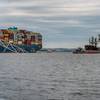New Int’l Convention for Ship Recycling
A new international Convention on ship recycling has been adopted by the International Maritime Organization (IMO). The Hong Kong International Convention for the Safe and Environmentally Sound Recycling of Ships, 2009 is aimed at ensuring that ships, when being recycled after reaching the end of their operational lives, do not pose unnecessary risk to human health and safety or to the environment.
The Convention was adopted at a diplomatic conference held in Hong Kong, China, from 11 to 15 May 2009, attended by delegates from 63 countries. The new Convention was developed by IMO, the United Nations specialized agency with responsibility for the safety and security of shipping and the prevention of marine pollution from ships.
Speaking at the close of the successful conference, IMO Secretary-General Efthimios E. Mitropoulos expressed satisfaction that the new Convention, named after the host city, was adopted by consensus in the best traditions of the Organization. He told delegates that the new Convention struck the right balance between the responsibilities and obligations of shipowners, ship recycling facilities, flag and recycling States. He added that the Convention, as adopted, allows for future improvements and provides "a platform and an avenue for better regulation, in due course, of the activity it addresses.
"I believe it is a good outcome in the circumstances", he said, "as it has succeeded in putting in place international rules and standards to regulate, for the first time, a complex and multi-faceted issue."
He urged Governments now to turn their attention to the important task of bringing the Convention into force at the earliest possible date and, thereafter, to promoting its uniform and effective implementation. "The closure of the Conference," he said "should mark the beginning of strenuous efforts: first, to initiate, back home, work to ratify the Convention at the earliest possible opportunity to expedite its entry into force; secondly, to initiate action to provide technical assistance to requesting countries without awaiting its entry into force; and thirdly, to initiate action, as may be necessary, to ensure the effective implementation and proper enforcement of the Convention when it comes into force."
The new Convention intends to address all the issues around ship recycling, including the fact that ships sold for scrapping may contain environmentally hazardous substances such as asbestos, heavy metals, hydrocarbons, ozone-depleting substances and others. It will address concerns raised about the working and environmental conditions at many of the world's ship recycling locations.
The text of the ship recycling Convention has been developed over the past three years, with input from IMO Member States and relevant non-governmental organizations, and in co-operation with the International Labour Organization and the Parties to the Basel Convention.
Regulations in the new Convention cover: the design, construction, operation and preparation of ships so as to facilitate safe and environmentally sound recycling, without compromising the safety and operational efficiency of ships; the operation of ship recycling facilities in a safe and environmentally sound manner; and the establishment of an appropriate enforcement mechanism for ship recycling, incorporating certification and reporting requirements.
Ships to be sent for recycling will be required to carry an inventory of hazardous materials, which will be specific to each ship. An appendix to the Convention will provide a list of hazardous materials the installation or use of which is prohibited or restricted in shipyards, ship repair yards, and ships of Parties to the Convention. Ships will be required to have an initial survey to verify the inventory of hazardous materials, additional surveys during the life of the ship, and a final survey prior to recycling.
Ship recycling yards will be required to provide a "Ship Recycling Plan", to specify the manner in which each ship will be recycled, depending on its particulars and its inventory. Parties will be required to take effective measures to ensure that ship recycling facilities under their jurisdiction comply with the Convention.
A series of guidelines are being developed to assist in the Convention's implementation. The Convention shall be open for signature by any State at the Headquarters of the Organization from 1 September 2009 to 31 August 2010 and shall thereafter remain open for accession by any State. It will enter into force 24 months after the date on which 15 States, representing 40 per cent of world merchant shipping by gross tonnage, have either signed it without reservation as to ratification, acceptance or approval or have deposited instruments of ratification, acceptance, approval or accession with the Secretary-General.
Furthermore, the combined maximum annual ship recycling volume of those States must, during the preceding 10 years, constitute not less than 3 per cent of their combined merchant shipping tonnage.
The conference also adopted six resolutions as follows:
Resolution 1: Expression of appreciation to the host Government;
Resolution 2: Contribution of the Parties to the Basel Convention and the International Labour Organization in the development of the Hong Kong International Convention for the Safe and Environmentally Sound Recycling of Ships, 2009;
Resolution 3: Promotion of technical co-operation and assistance;
Resolution 4: Future work by the Organization pertaining to the Hong Kong International Convention for the Safe and Environmentally Sound Recycling of Ships, 2009;
Resolution 5: Early implementation of the technical standards of the Hong Kong International Convention for the Safe and Environmentally Sound Recycling of Ships, 2009; and
Resolution 6: Exploration and monitoring of the best practices for fulfilling the requirements of the Hong Kong International Convention for the Safe and Environmentally Sound Recycling of Ships, 2009.
The Diplomatic Conference was attended by delegations from 63 IMO Member States, as well as by observers from two Associate Members, the United Nations Environment Programme, ILO, the European Commission, and eight non-governmental organizations. It was organized with the support of the Government of China and the Marine Department of the Government of the Hong Kong Special Administrative Region.










